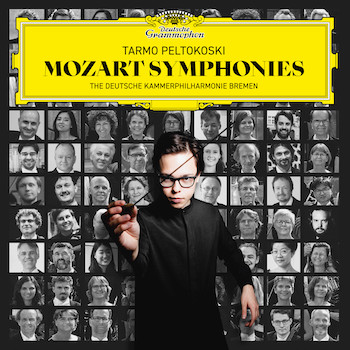Classical Album Review: Alive and Conversational Performances of Mozart Symphonies
By Jonathan Blumhofer
Some solidly impressive Mozart — aside from the filler, 15 minutes of mono-dynamic, schlocky medleys.
 “Child prodigism,” Jascha Heifetz is once reported to have said, “is almost always fatal.” The violinist, a former child prodigy himself, would have known. And yet, like much of the rest of the world, the classical music machine seems to find youth crazes irresistible.
“Child prodigism,” Jascha Heifetz is once reported to have said, “is almost always fatal.” The violinist, a former child prodigy himself, would have known. And yet, like much of the rest of the world, the classical music machine seems to find youth crazes irresistible.
The latest one involves conductors from Finland. Recently, the 28-year-old Klaus Mäkelä, whose recordings have ranged from fair to middling, got himself appointed music director of the Chicago Symphony Orchestra — that on top of gigs in Oslo, Paris, and Amsterdam. (He seems to leave a better impression live than on disc; an admitted propensity to treat recording sessions as a sort of aural Photoshop may help explain his thus far underwhelming discography.)
Now, Mäkelä’s compatriot, the 24-year-old Tarmo Peltokoski, has arrived with his first album, a cycle of Mozart’s Symphonies Nos. 35, 36, and 40 on the venerable Yellow Label, Deutsche Grammophon.
If the younger maestro’s approach to the recording studio is the same as his older colleague’s, there’s no sign of it here. Rather, the playing of the Deutsche Kammerphilharmonie Bremen is alive and conversational. Attacks are crisp, rhythms tight, the dynamic range wide, and tempos mostly well judged. Peltokoski clearly understands that this music can take a punch or two and he shapes it accordingly.
Notably, in each symphony, the most interesting moments come in the middle two movements. Instead of treating the minuets as obligatory, stylized sections, they’re sculpted and phrased with becoming lightness and color. The results sound and feel like true, functional dances.
The slow movements, too, all flow beautifully. To his credit, the conductor doesn’t milk the music for anything that’s not there, and his interpretive additions — like the fetching embellishments on the exposition repeat during the Haffner Symphony’s Andante — are judicious.
While the outer movements of this symphonic trio all speak energetically, they’re sometimes a touch literal. The Haffner’s finale lacks abandon and the G-minor’s Molto Allegro would benefit from a bit more room to breathe. But the latter’s finale showcases some excellent ensemble work (especially from the Kammerphilharmonie’s woodwinds), and the Linz Symphony, notwithstanding periodically insistent timpani playing, is fresh and bright.
Where the album takes a turn for the bizarre is in its filler, which consists of Peltokoski playing three original improvisations on themes from Mozart’s work. Alex Ross described the first of these as “the kind of thing you might hear in the cocktail lounge of a very weird Viennese hotel,” and it’s hard to shake that impression — though traversing the triptych also brought to mind the experience of sitting through a church service during which a keyboardist who was auditioning for an appointment repeatedly exerted himself far beyond his natural musical abilities.
Now there’s no question that Peltokoski’s got these blunderbusses’ cascades of filigree under his fingers. And there’s certainly an argument to be made for exploding the pomposity that often surrounds canonic composers like Mozart (remember: the premiere of Beethoven’s Violin Concerto also involved the soloist, Franz Clement, playing some of his own compositions on one string of a violin held upside-down).
But it’s hard to imagine that 15 minutes of mono-dynamic, schlocky medleys is the best way to accomplish that end. Compositionally, these improvisations meander. Stylistically, they veer from Liszt at his tackiest to John Tesh at his best, by way of imitation Gershwin and Piazzolla.
Musically, they’re shallow and too clever by half. Whoever sanctioned their inclusion here should have known better: their pretentiousness detracts from the album’s main item, which is some solidly impressive Mozart.
Jonathan Blumhofer is a composer and violist who has been active in the greater Boston area since 2004. His music has received numerous awards and been performed by various ensembles, including the American Composers Orchestra, Kiev Philharmonic, Camerata Chicago, Xanthos Ensemble, and Juventas New Music Group. Since receiving his doctorate from Boston University in 2010, Jon has taught at Clark University, Worcester Polytechnic Institute, and online for the University of Phoenix, in addition to writing music criticism for the Worcester Telegram & Gazette.
Tagged: Deutsche Grammophon, Deutsche Kammerphilharmonie Bremen, Klaus Mäkelä
